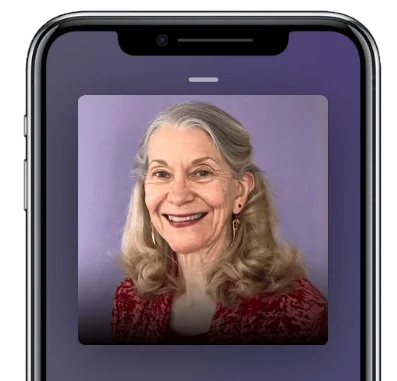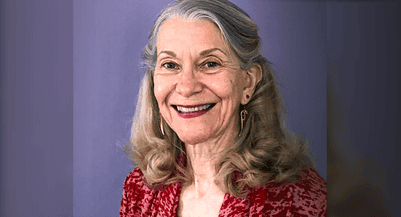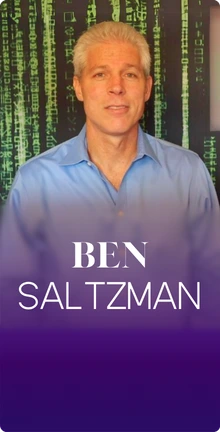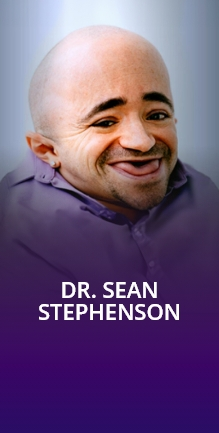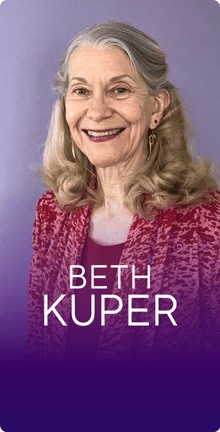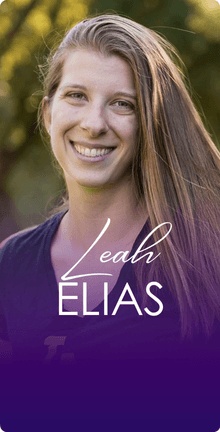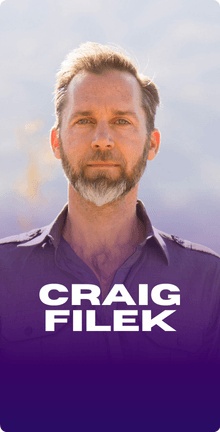In this Episode
- [02:28]Beth explains the Enneagram and how it differs from other personality tests and assessments.
- [07:01]In Enneagram, there are questions asked of the client to reveal their patterns, motivations, and desires. Stephan addresses some questions with Beth.
- [12:05]Under what type of personality describes qualities of Stephan?
- [21:57]Beth elaborates on understanding your personality type and empathizing with others’ personality types.
- [25:15]The five steps of the proactive formula in Kabbalah.
- [31:43]Stephan mentions some other personality assessment programs he tried or heard of and asks Beth for her opinion of these assessments.
- [35:51]What’s Beth’s personality type in the Enneagram personality assessment?
- [40:11]What fun exercise does Stephan recommend to Beth?
- [42:34]Are you interested in taking the Enneagram personality assessment? You can get in touch with Beth at www.internationalenneagram.org or email her at be*******@***il.com.
Beth, it’s so great to have you on the show.
Thank you so much, Stephan. I’m very happy to be here.
We’ve known each other for a little while. You’ve helped me with bringing on some great team members over the course of time as a recruiter, but in this episode, we’re going to focus on the Enneagram because it’s such an empowering and potentially life-changing tool that deserves some time.
We did have a previous guest talking about the Enneagram a while back, but I think that you have a unique take and way of explaining it. Talking about the value of that is worth a second look.
Enneagram is very helpful in showing us what our patterns are.
First of all, if you could explain to our listener, what is the Enneagram and how does it differ from other types of personality tests and assessments that people take on themselves?
The Enneagram is a system of nine personality types, but the purpose is once you understand what your type is to be used for transformation and growth—so you’re not stuck in your type—the idea is that by understanding it, you can move out of it and access the gifts of your type.
Every type has got a certain habit of perception. We see certain things. We just eliminate certain other things, and we think we’re seeing the full view. Actually, we’re not. It’s very revealing once we learn the other eight types besides our own type that there are a lot of other very legitimate ways of looking at people and their perceptions. Enneagram is very, very helpful in showing us what our patterns are.
If I am a particular type and I want to relate to somebody who’s a different type, do I switch my type, or do I just have more empathy for the type that that person has by understanding that type more, trying to get into their world, and seeing through their lens?
I would say you will certainly have more compassion for them. You’ll be more open-minded towards them. You don’t actually change your type, but you can broaden your perspective. Also, there are levels of health in a type. You could be a very healthy type. You could be average. You could be unhealthy.
There are all these different behaviors of the types, but the most important thing is to understand what the motivations of the type are. If you’re talking with somebody else, you want to talk in their language. If you understand what their patterns and motivations are, you’ll be more likely to make connections.
What would be an example of one type that doesn’t really usually mesh with another type? How might you connect better with that different non-compatible type?
Type One is very morally upright. They want to bring out the best in people.
That would have a lot to do with the levels of health. Let’s say you’re dealing with an average type. Let’s say you were dealing with type One. Type One is very morally upright. They want to bring out the best in people. They want to improve themselves and everybody else, so sometimes, they can come off as being very critical and judgmental.
Type Two, for example, is the Giver. That’s loving, giving, and being very kind and empathetic, but they also don’t want to admit that they have any needs of their own. They want you to guess what their needs are and they feel that you should just understand that.
A type Two, for example, might feel that a type One was being very judgmental when a type Two just wants to open their heart, but really, they could be manipulative underneath that.
Any type can understand or misunderstand any other type simply because of the levels of health. There’s a high side and there’s a low side to every type.
Right. If you had to guess which type I am because I haven’t taken the Enneagram assessment, what would your stab in the dark be? I know that’s unfair because I didn’t actually do the homework of doing the assessment.
First of all, I wouldn’t guess what your type is. I don’t go around telling people what I think their types are. But I might ask you some questions to let you reveal your type and help you understand and see what your type is because it’s your journey of exploration. It’s not about me deciding what you are and guessing right.
Type Two, is the giver. That’s loving, giving, and being very kind and empathetic.
If I were to take the assessment, how long would it take me to just fill it out on my own?
Oh, 5–10 minutes.
Okay. I should make the time to do that.
Most of the time, the assessments don’t necessarily tell you what your type is. I use them simply to eliminate the types that you aren’t. I can see you don’t have any relationship with certain other types, but there are two or three types that you might be.
When I do an Enneagram insight session where I’m helping you find out what your type is and what your motivations, basic fear, basic desire, and all those kinds of things are, then I have fewer types that I need to look at to try to discern what might be yours. Then, of course, I’m going to ask questions. I have an idea what your type might be, so I’m going to ask you questions that might help reveal what that is.
What would be some example questions that you might ask a client?
For you, I might ask, do you value a very peaceful and harmonious environment and relationships with people? Is that something that’s really important to you?
Yes.
What happens when you’re in a very conflictual situation? What happens with you inside?
I get very uncomfortable and antsy, and I want to find the exit.
So you want to leave the situation?
That’s more of a shadow side, I guess. I do want to patch things up or make things right. I wouldn’t want to just leave things untended to if it’s my fault especially. If I feel that I’m responsible in some way for the conflict, I do want to make things right.
How are you in terms of work? How do you feel about how hard you work?
I work very hard. I love my work. I feel like I’m revealing light in everything I do. Whether it’s a podcast interview like this, a speaking gig, a client call, a prospect call, or working on an SEO audit, I feel like I’m doing something worthwhile and valuable and contributing to the greater good.

Do you sometimes feel like you have too many ideas or too many projects that you’d like to be doing?
So many. I’m awash with ideas. I think most of them are good, so it’s overwhelming and frustrating for me. It’s a quality problem—I understand that—but it stresses me out. I go into my to-do list and I have probably 6000 items in there.
You’re being literal. You’re not just being figurative. You actually have that many. I know you do.
Yeah. I have 5000–6000 exactly.
Do you have trouble setting priorities?
Yes, everything is important.
Right. When you were growing up, did you feel that you were important in your family, or did you feel maybe you were overlooked? What was your family’s attitude towards you? How did you feel about yourself really in your family?
I was definitely neglected, but I knew that they weren’t at fault and that it wasn’t a nurturing environment. I could always count on myself. I grew up fast. I was very mature for my age.
Did you find it difficult at any point in your life to decide who you are and what your purpose is in life? How did that unfold for you?
It was difficult for me. It wasn’t difficult in that I felt like I should be working on curing cancer or something in that regard. I would study very hard. First, it was molecular biology in undergrad and then biochemistry in graduate school, but then I dropped out of the Ph.D. to start an Internet company.
Finding your Enneagram type doesn't mean it is who you are forever. What's great about self-assessment is when you're aware of who you are, you now have better ways to access your true gifts. Share on XIn some sense, I felt like I was letting myself down and not living up to my full potential, but in retrospect, I did exactly what I was meant to do. That was part of my path. I’m definitely on my purpose and soul path and making really good progress on that, but at the time before my spiritual awakening, I didn’t have that clarity.
How old were you when you had this spiritual awakening?
The first one was in 2012, age 42, and then the second one was last year, January 22nd.
Very recent. Can you tell me about the one last year?
Sure. I’ve talked about it before in this podcast, so my listener may have already heard this. I prayed to God for a job. It was January 22nd, it was the middle of the night, and He answered immediately. He revealed the matrix to me and showed me a lot of what was happening behind the scenes in this reality.
That changed everything for me. The reason for asking for a job was I was inspired by Sheila Gillette who is a psychic I interviewed back in 2020. She had prayed for a job when she was on her deathbed. I didn’t want to have a near-death experience to get a job. I just wanted the job, and I got it.
So this job was revealed to you?
Yes.
Is it in alignment with what you’re doing now?
Yes. I’m an ambassador of spirituality.
Very nice job title.
It’s not about the job title. It’s about how I show up in the world.
Only you can decide what your type is.
Yeah. So much of what you’ve said leads me to reflect. Should I tell you what I hear in what you’re saying? I suspected this about you, but of course, I wanted to ask you these questions though. Only you can decide what your type is, but I’ll just tell you what I hear.
You have revealed many, many qualities of type Nine. Type Nine is called Peacemaker. There are many different nicknames for each one of the types. The numbers are always the same. Nine is always Nine, but it could be called the Peacemaker, the Harmonizer, or something like that.
Peacemakers are relaxed and laid back. They tend to be calm, friendly, and open. They can see everybody’s point of view and they want to create harmony in an environment. Disharmony can be very upsetting to them.
Also, because they can see so many points of view, they can have issues with trying to find out who they are, what is their identity, and what is their purpose because they see everybody else’s. It’s difficult for them sometimes to reflect on themselves because it’s just easier to go along with the group and other people’s agendas. They have this urge to merge.
There’s a deadly sin and a holy virtue for every one of the Enneagram types. The deadly sin for type number Nine is sloth. Some Nines would just zone out on TV or whatever their addiction is, and it can be just too much of anything that’s not essential.
Type Nine is called Peacemaker. They are relaxed and laid back. They tend to be calm, friendly, and open.
Another way of understanding that is spiritual laziness because they don’t develop themselves. They want to merge with everyone else and follow everyone else’s agenda. That’s kind of your average Nine. When they wake up to themselves, they say, who am I? What do I want? What is my purpose?
Nines’ children often felt overlooked. They felt that they were of no account, they weren’t important, and they didn’t get support. When they start finding themselves, then they realize they have tremendous talents and tremendous abilities. They can bring people together. They can harmonize. They can see the big picture. When you talk about seeing the matrix, that is a very, very big picture.
Then, the Nines can’t align themselves. Okay, what is my purpose? What do I want, not just what does everyone else want? Those are just a few of the qualities of the type Nine. They can be very magnanimous and very calming to other people. They can really help other people find themselves. They’re sometimes called the sweetheart of the Enneagram. Everybody likes a Nine. They’re great people to be around in their healthiest state.
To me, you sound very much like a Nine. In terms of your work and so on, in the Enneagram, let me just show you something. I just happen to have this here. This is a diagram with the Enneagram. You can see Nine is right up there on top. You see there are two lines that go out from Nine. One goes down here to Three. One goes down here to Six. These are your paths of growth.
Your path of growth to type Three is your path of growth through integration. That’s where the Nine lets go of their tendency to have too much, too many options, and too many things to choose from and they can’t make up their mind.
When they go down to Three, they pick up the high side of Three. They don’t actually become a Three, they just pick up qualities of the Three. Threes are very focused, very goal-oriented, very achievement-oriented, and success-oriented.
The Nine picks that up and guess, okay, who am I? What do I want? Let’s get focused. Let’s get rid of the nonessentials and let me focus on what it is, what my gifts are, and what I’m doing.

Sometimes, Nines can be absolute workaholics. You have to understand that the deadly sin of sloth has many different definitions of exactly what that is. Anyway, when the Nines get focused, then they can really find who they are and what their contribution is.
I’m definitely getting to that point. I’m working actively on shedding the nonessentials. Even though I still have that to-do list of 6000 items, I don’t get bogged down by them. I almost archived all of them and started to declare to-do list bankruptcy, but I couldn’t bring myself to do that yet. But I get very focused and I work really, really hard, especially on my spiritual mission.
In the past, I binge-watched TV shows and spent a lot of time doing unproductive things, but that’s in the distant past for me.
It sounds like you’re working on the high side of that path of integration. The other line which goes down from Nine is you can see the Nine goes down to Six. That’s the path of stress.
We can learn through integration and we can learn through stress. Most of us learn through stress a lot of the time. When Nines go down to Six, instead of being calm, peaceful, and harmonious, they can pick up some of the other aspects of Six. They can feel uncertain and fearful. They cannot know what to do and what other people’s opinions of should I do this or should I do that? They become very indecisive and anxious.
Normally, Nine is quite calm, but then they can pick up the anxiety. You’ve got two lines. When you move on those lines of growth, you can pick up the high side and you can pick up the low side of these other two types. That all depends on how conscious you are. If you can catch yourself, you say, ‘oh, I’m doing it.’ Then, you can go, okay, I have a choice here. I don’t have to just do that instinctual behavior and automatic habit pattern that I do when I get stressed. I can choose something different.
There’s this wonderful quote by Viktor Frankl which I love. I have it posted on my monitor because I like it so much. He says, “Between stimulus and response, there is a space. In that space is our power to choose our response. In our response lies our growth and our freedom.“
With the Enneagram, we want to expand that space between the stimulus and the response so that we have a choice. By understanding our types, understanding the high side, understanding the low side, and where we go, we can have a choice and say, no, I’m not going to do that. I’m going to choose something different. Really, it is only in our choices that we have freedom.
Yeah. One thing I learned recently through this awakening that happened last year is that free will really is in the moments in between that space. That’s where free will is. Every other seeming choice that we make about who we hire, who we fire, who we do business with, et cetera, is just mapped out for us. It’s like we’re playing the part in the play that we co-wrote ourselves. It’s in those moments where we choose to be non-reactive and we restrict that reactivity, and the moments where we choose to go beyond into an area of proactivity that is unusual for us. Otherwise, we’re on autopilot.
It's our mission to understand why we're here witnessing this life we have. And in this journey, we should be able to understand others as well. Share on XThe whole play is already written. In the moments in between when you are making a more proactive decision or action that is above and beyond what you normally do, that’s where you reveal light and jump timelines. You get a timeline upgrade.
That’s my understanding of where free will is and how it relates to the space that you talked about from that Viktor Frankl quote. What do you think about it?
I like the timeline jump and move into another timeline so you have another destiny.
Yes.
And by revealing and understanding that, you can work more consciously towards creating that. But you have spiritual support in doing that. You’re certainly a lone ranger here.
Right. It’s so much guidance. Stuff that just pops into our mind isn’t from us. A lot of it is our guidance and spiritual support team.

I like that. We have invisible means of support.
Once you know your type, you know whether you’re on the healthy side, the shadow side, or average, and you know how you connect with the other types, what are some tangible, daily next actions to take so that you stay on the high side, relate better to the other types, and maybe integrate some of the higher attributes of the other types that you’re not?
I would say the first thing is you need to understand your own type, habits of perception, compulsions, blind spots, and all of that. The Enneagram is just a fabulous tool for that. It really is my favorite tool of all the different personality typing systems I’ve studied. I study quite a few of them in my life because I’ve been so interested in all of that.
You have to understand your own type. We move up and down the levels of health many times during the day. You may have a moment of irritation where you’re totally pissed off, and then you drop it.
That doesn’t remain constant, but becoming aware of that and becoming aware of our paths of growth like, okay, which is our line or path of integration, which is our line or path of stress, what are we being challenged by, and how are we reacting to it has a lot to do with self-observation. I would say the most important thing is after understanding your type, of course, it helps you with your self-observation, so you can see what it is you’re doing without judging.
In order to do self-observation, you have to first know your patterns.
That’s the most important thing about self-observation. You’re seeing in a neutral place, you’re not judging in any way, and actually, you’re not trying to change anything either. You’re not just trying to be better. No, you’re just observing. When you’re observing, you can pause, and then you can see perhaps a path you can take, a perception, something you can say, or anything like that which is more conscious and more present than your automatic reaction.
I would say self-observation is a great tool. In order to do self-observation, you have to first know patterns. You have to know what your patterns are. You have to be able to see them, then you can change them, and be much more tolerant of other people.
I think of my mother. My mother was a type One. When I understood what that was all about, I didn’t have to take her criticisms so personally. She wasn’t criticizing me to be mean. She was criticizing me because she was trying to help me be a better person.
I had to understand what her motivations were, not just what it felt like to me and what my reactive self saw. It gave me a lot more compassion and understanding toward her.
It helps with all the types. I don’t have to know what somebody’s type is. I just get a feel for it.
When you understand and empathize with that person and understand their world, what triggers them, what their type is, and all that, I think it helps them to get into a healthier, more empowered version of themselves and a healthier version of that personality type, right?
Definitely. Of course, when you can see someone with compassion, instead of telling them what they are, just ask questions. Find out how they see themselves and how they’re feeling because it’s a matter of them understanding themselves, not me telling them what they should do or how they should be.
Yeah. That proactivity in a moment of reactivity that you choose a different path reminds me of the proactive formula I learned in Kabbalah class. It’s actually in the episode I did with Yehuda Ashkenazi, one of my Kabbalah teachers, episode number 98.
The proactive formula goes like this. There are five steps.
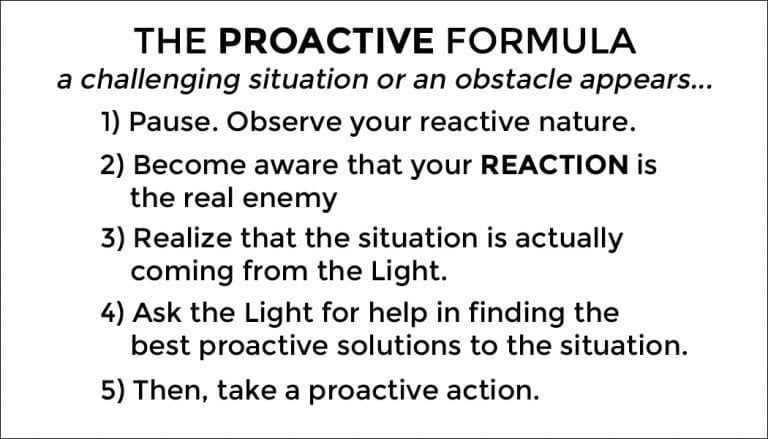
When a challenging situation or obstacle appears, first, you pause. That dovetails nicely with what we’re saying. That gives you the space to observe your reactive nature.
Step two is then to become aware that your reaction and not the other person or situation is the real enemy. Your opponent is your reactivity. It’s not the person you’re in conflict with.
Then step three is to realize that this situation is actually coming to you from the light. The Creator has given this to you as an opportunity for growth.
Then step four, ask the light for help in finding the best proactive solution to the situation.
Then step five is to take that proactive action. It’s really powerful.
Great. That’s a lot of food for thought there.
Yeah. If we are a student of our own reactive nature and work on awareness of our awareness, it unlocks a door that just changes everything the more that you’re aware of your awareness.
Understanding who we are gives us a better perception of how we want to show up in the world. When our inner selves are alit, our path becomes brighter. Share on XThere was a famous, very righteous Rabbi Kabbalist. I forget if it’s Rabbi Akiva or who it was, but he had so much awareness that he would talk to his body. He would say, ‘all right, body, we’re going to go take a bath now.’ We don’t have a soul. We have a body. We are a soul.
He had that constant awareness of his awareness that was incredible. I want to be that aware. I slip back into the autopilot mode a lot, but I get more and more glimpses of the bigger picture by just zooming out a bit.
I’m curious to hear what the applications of the Enneagram would be in the case of hiring a staff person. You’re a recruiter. You use the Enneagram in the hiring process, I believe. Of course, you have the certification and the expertise to coach people on the Enneagram separately from a hiring initiative, but how does it come into play when you’re looking to hire somebody?
As much as I would love to talk about the Enneagram when I’m interviewing somebody, I have so many questions. I have 20 questions that I need to ask them regarding their background, deposition, and all those sorts of things, so I don’t really have the time to delve into their Enneagram type. But I’m always observing them. I’m always watching and I often will get a feeling for what their type might be.
It doesn’t matter what number you are. It matters how healthy and self-aware you are.
I might ask them if they have ever heard of the Enneagram or know anything about it. It’d be very, very brief. But what I would look for is their levels of health, not their type. It doesn’t matter what number you are. It matters how healthy and self-aware you are. Those are the things that I’m going to be looking for.
Now, occasionally, I will run into an applicant that I’m interested in for a particular position, they do know their Enneagram type, and we will get into a conversation about it. That can be really, really helpful, but it is not a necessary thing.
What I do is a lot of my clients are coaches, so they have their coaching students. Some of those clients will ask me to do an Enneagram insight session. It’s a 2 or 2 ½-hour session with their students to find out and determine what their Enneagram type is and what their wing is, which is a type next door to your type that influences your type a great deal.
Then, when the coach knows that, if the coach knows the Enneagram or I can help them understand it, then they have a better idea of how to coach the person because what they’ve got is a composite picture of that person right away if they know what the type is. They know the high side, they know what the average side may be, and they will be able to speak in that person’s language. They will understand what their basic fear is, what their basic desire is, what their habit patterns are, where they get hung up, and so forth. They’ll have an understanding of all of that.
It’s a matter of just unpacking that type. They can be very much more directive in asking questions of the student. We’re drawing them out. Or if it’s a coaching client, what their goals are, what their purpose is, or what their issues are. That can be tremendously helpful.
Right. If you’re dealing with a personality type One and that’s your client you’re coaching and they start getting rigid, then you can respond in a way that is different from (say) a type Nine. They’re losing themselves or getting slovenly. It’s binge-watching too much Netflix instead of taking massive action.
The coach can inquire further. Where does this come from? How much are they aware of it? Is this something they want to let go of? Is this a place that can soften? Because when a person knows their habit of perception, if you can soften your habit of perception and relax it, then you have a much larger arena in which you can work, perceive, and make choices.
The most important thing about self-observation is seeing things from a neutral place. You're not judging in any way; you're not trying to change the external stuff that’s happening in your life. Share on XThere’s another personality assessment that gives you a lot of insight in that regard. It’s called PRINT, a code developed by Debra Levine who was a guest on this podcast several years ago. It’s an amazing episode.
The PRINT assessment allows you to understand what your unconscious motivators are or somebody else’s and what their triggers are. It’s really, really helpful.
You’re either in your positive, healthy version, or you’re in your shadow side. In the shadow side, you get triggered. You can have a list of what those triggers are that you put on your refrigerator. Debra and her husband, the two creators of PRINT, actually have on their refrigerator hanging up the triggers for her and the triggers for her husband as a reminder of what’s triggering each other and also be mindful to be more conscious and less on autopilot. It’s really cool.
I heard about PRINT from folks in The Strategic Coach, Dan Sullivan’s program. They’re very pro-PRINT assessment. I’ve done a number of assessments including Predictive Index, Myers-Briggs, and StrengthsFinder. Sally Hogshead has her Fascinate Assessment.
I love these assessments, but I’m curious to hear what your thoughts are on what I just described with the PRINT assessment.
I am very interested in it. I’m certain that I listened to that. I think she was an Eight when she talked about Enneagram, and I think her husband was a Five. I’m not sure. Don’t quote me on that because it had to be at least a year or more ago that I listened to that one.
I was fascinated with it because I went, this has a lot to do with the Enneagram. These people definitely know the Enneagram. I thought, yeah, this sounds really good.
I looked into it. I know it’s expensive, but it looked very worthwhile.
I think it’s maybe a couple of $100, maybe $300 or something like that, so not prohibitively expensive for a lot of people. I think it’s essential.
There’s the Kolbe assessment too. The Strategic Coach is really big on getting your Kolbe assessment. Mine is 3393. The Nine is the Quick Start. I’m constantly starting new things. I have an idea per minute.
This is not about cognitive ability and strength. This is about conative. That’s Kolbe. Then, to dovetail that with the PRINT assessment to see and understand your unconscious motivators and triggers is the one-two punch according to Dan Sullivan in Strategic Coach.
I like that. I think those can be very, very helpful and certainly helpful in understanding who you’re hiring. It’s good to do some of those assessments because you really need to see not only what their strengths and abilities are but how well they’re going to work with the team as well. How much is going to be similar to you because you’ve got to have an understanding? How much is going to be complementary?
If you’re Quick Start, you might not want to hire somebody that was very, very strong in Quick Start because you’d both be really good in that area, but there may be other areas that you need that position to fill in for. Has that been your experience?
My next question, I’m curious to hear what your personality type is on the Enneagram and how your knowledge of that personality type has impacted how you show up in the world.
I’m type Five, which is the Investigator. I love to learn. I love to investigate. I have learned many, many profiling systems.
I love to learn and investigate.
Another nickname for type Five is the Observer. I don’t like that nickname so much because I’m not just observing, I’m actively involved.
Type Fives have a lot of awareness and incisive questions, can have flashes of brilliance at times, and can see a very, very large point of view in terms of research and understanding of many, many different things.
The downside of type Fives was surprising to me because I didn’t even realize it until I learned the Enneagram. Fives live in a world of scarcity. The glass starts off half full and it’s being used up as the day progresses.
Fives want to conserve their time, space, and energy. They don’t want to be intruded upon. For me, I need a certain amount of time alone. I need to focus. I can have a very, very deep focus. I have too many things that I’m interested in, so I have to really pay attention to what the priority is. Because there are so many things I could be exploring, I want to make sure that I have the time to do that.
Another thing with myself, I want to share what it is that I know not just to gather information and knowledge but to share it with others and help others make better decisions.
When I am doing interviews, for example, I listen very closely and very deeply. I take a lot of notes, and then I quote back to the person certain things they say because certain things will pop up for me so that I can reflect on the whole big picture.
I want to share what I know, not just to gather information and knowledge but to share it with others and help others make better decisions.
Something that comes to me that I think will be very helpful for you with what you’re just describing. I learned this from Brendon Burchard. He’s teaching a large audience. I was at one of his events.
What he said was that you got to think of yourself as a power plant. A power plant doesn’t consume energy. It generates energy. If you can see that I’m not using up my half-filled glass of water throughout the day, I’m not using up my willpower, or I’m not using up my energy stores, I’m actually generating energy as the day goes on.
That’s really good. I like that analogy. There are other types like Eights that never wonder if they have enough energy to get through the day. A lot of that is fear-based. I won’t have enough, therefore I have to conserve the little bit that I have and just move forward regardless of how I’m feeling about the amount of energy that I have.
Move forward to be able to create energy and gain energy from interactions with people. Fives often withhold that energy. Sometimes, I have to make myself go out and socialize. I like people. One-on-one is more comfortable for me than perhaps a group, but I have to realize that how I’m feeling may not necessarily be telling me the truth about who I am.
I think there’s an important distinction here, though, that you said to gain energy. This is different. Generating energy is you’re creating it. There’s the law of conservation of energy, energy cannot be created or destroyed. You’re tapping into the powerhouse of you. You have your divine spark inside of you and you can tap into that so that it’s almost like a nuclear power plant tapping into the power that is innate and trapped inside of atoms. Instead, you’re tapping into your divine spark.
I like that, generating energy, not just trying to gain energy from whatever. We try to gain energy from food or from all kinds of things. I will remember that. That is a wonderful metaphor and a wonderful analogy.
Here’s a really fun exercise that allows you to tap into that and not just access it but embody it. I learned this from Tina Zion. She mentors me on medical intuition and psychic stuff. It’s called the Toroidal Field exercise.
It’s really simple. Your feet are connected to the ground and you’re drawing up from the earth four different types of energy. They are rainbow light, golden angelic light, diamond-like sparkles, and violet flame. Violet flame, by the way, releases karma. That’s a really good one. St. Germain is the keeper of the violet flame.
Anyway, you would draw up all four of those energies. You can do them one at a time or all at once.
Let’s actually try it. Let’s do them one at a time. I’m going to breathe in and draw up the rainbow light. Let’s start with the rainbow light. As you’re drawing it up, it’s flooding your body and pouring out at your fingertips and the crown chakra like a fountain. That’s the rainbow light. Let’s now do the angelic golden light. Next, we’ll do the diamond-like sparkles. Finally, the violet flame.
I feel so energized. I just generated a whole ton of energy, and I can go into my next appointment all ready to serve and reveal light.
That’s wonderful. I can feel it too. I will continue practicing this. It’s very simple. It’s quick. It’s effective.
It is. It’s really cool. How does our listener or viewer work with you on doing this Enneagram insights session with you or hire you for the recruitment of new important hires in their company?
They can get in touch with me. I do a complimentary get acquainted Zoom call and find out what their needs are, what they desire, and so forth. Then, we can go from there and see what would be most appropriate for them.
They can contact me at my email which is be*******@***il.com. I’d be very happy to talk to anyone who’s interested. Whether they want a session for themselves or for any of their clients that they’re working with, we can discuss all those things.
If you are a student of your reactive nature and work on awareness of your awareness, it unlocks a door that changes everything. Share on XOr their important team members.
Exactly. I do team meetings as well. I do individual sessions with individuals, then I put them together. I really give them permission to talk about things that they might not be comfortable just talking with one another about or might not want to bring up and then understand how each of them is perceiving things, how they’re responding, how they like to be complimented, how they like to work together, and how they like to get feedback.
It’s really remarkable what comes out because the container is the meeting that we have. All I’m doing is just asking a few questions, so it can be quite unpredictable what does come out. It’s always been very, very helpful for everyone and certainly enlightening for me to see how the times work together as a team.
If somebody has already done other kinds of assessments like Myers-Briggs, StrengthsFinder, Predictive Index, Kolbe Index, and any of that, if they send those to you, is that helpful in your understanding?
Yes, absolutely. The thing that I studied the longest has been astrology. I’ve been studying astrology for well over 50 years. If I have their chart and I know what their Enneagram type is, the two work extremely well together. I love Myers-Briggs. I’ve been one of the editors on several books on Myers-Briggs, so I like that a lot.
Higher Alignment is an energetic system that I have learned. I spent many, many years reading people’s energies. I like to put them all together which is very typical of a Five, learning many, many different things and putting them all together into a composite. The challenge, of course, is not just learning these things but actually doing something with them and sharing them with the world, which I am very eager to do.
Yeah, actionable insights.
The more different types, the more profiling systems that I have. There’s an old expression, “The more tools in your tool bag, the lighter your load.“
That’s great. Thank you so much, Beth. Again, listener, if you’re interested, check out Beth and send her an email at be*******@***il.com.
I’m your host, Stephan Spencer. I wish you all the best this coming week. Get out there, reveal some light, and make a difference in the world. We’ll catch you in the next episode.
Important Links
Connect with Beeth Kuper
Apps/Tools
Businesses/Organizations
People
Previous Get Yourself Optimized Episodes
YouTube Videos

